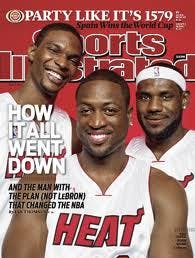I’ve always thought that the impact of a single person on an organization is fleeting. Even extremely talented individuals have limited impact without a cast of supporting people, opportune circumstances, and even, yes, a little bit of luck.
And while talent is universally prized and sought after (how many more “A players” articles do we have to put up with?), picking people who work well together and who make others better is ignored. We select managers because they can figure out team dynamics, get around personal disputes, and get optimal results — but we don’t pick employees that way.
And nowhere is that more true than in professional team sports. There’s a common goal and it requires everyone working together to get them. While teamwork is emphasized in professional sports public relations campaigns, many teams ignore that and simply try to assemble the most talented roster of players. Rarely does this tactic work.
As talent professionals, we need to admit that sometimes you don’t need a purple squirrel (or a super-hero squirrel).
Talent-holics Anonymous
Every time I’ve suggested we don’t need a purple squirrel, I’ve been initially rebuffed. “We need the best for every position,” they say. “We always want the more talented person,” they add.
I’ve been embarrassed to bring it up. I’ve felt guilty for even hinting that the company I worked for didn’t deserve the best possible employee. That is, until I realized that I did want the best employee for the position, it just wasn’t always the most talented one.
My position was much harder to justify, it was simpler and it took time to see that the approach worked. Certainly not having an unlimited budget has helped some of these conversations, but some of the more helpful examples have come from sports.
Pro teams demonstrate pain points
The NBA’s Miami Heat are off to a rough start, but the New Orleans Hornets are not. On paper, the heralded Miami Heat should be dominating their opponents, but they are not. They have two of the best five players in the league as well as a top 25 player.
The New Orleans Hornets, by comparison, only have a top 10 player and a couple of solid top 50 players, but they are exceeding expectations and outperforming the star-studded Heat. Both have young, unproven coaches. Both have played tough schedules so far. What’s the difference?
The devil is in the details. The Heat’s top two players are, without a doubt, the most talented on the floor most nights. Yet they don’t compliment each other well. It has made their offense go in fits and spurts sometimes. The lack of size and depth of their roster has also hurt them. Because they spent a lot of money luring these talented players to Miami, they just spent the bare minimum on a supporting cast. The New Orleans Hornets, on the other hand, have complimentary players and a deeper bench.
For those who focus on talent alone, those are some confusing results. The Heat should be much better and the Hornets should be a lot worse. Yet, there is another thing at play here.
Teamwork does matter
Team dynamics, roles, and chemistry all play a part in this discussion. Right now, it is talked about on every major sports news outlet. The same people who believed the Heat might challenge the Chicago Bulls’ record setting 72-10 regular season record are now asking why it hasn’t worked out in Miami.
Unfortunately, this happens in companies all of the time. The focus during the hiring process is all about talent, but the discussions about retention and performance when they are employees focus on how they fit in with the company and their role. Shouldn’t we be a little more thoughtful about the role culture, teamwork, and strengths as they compare to others on your team, as we look to bring on new employees?
Let’s not go overboard and say the only thing that matters is teamwork. That would be just as bad as the people those who focus solely on talent. After all, you still need people to execute those plans and work together.
But we can also acknowledge that teamwork is undervalued during the hiring process — and it takes guts to seriously incorporate it into your hiring process. It is up to talent professionals everywhere to step up to the plate and make the argument.
